| Home |
| Acknowledgments |
| Conventions |
| Glossary |
| Maps |
| References |
| Links |
| Articles |
| Thumbnails |
| Species
list |
| Family |
| Next
species |
Additional Photos
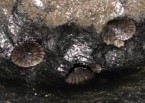
live, on wood
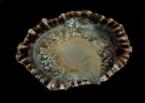
underside
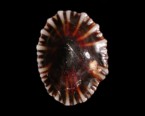
shell interior
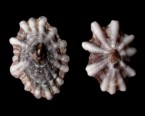
course ribs
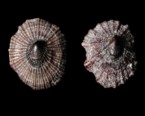
fine ribs
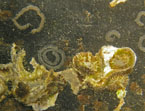
with egg masses

Siphonaria normalis Gould, 1846

| Maximum size: 20 mm shell
length (Kay, 1979). Identification: The shells of this species are limpet-like with white ribs and a glossy-brown interior. Anterior and posterior ribs are similar in size though the size of the ribs and the height of the shell vary greatly. (Note 1) Living animals are cream, mottled with gray and with yellow-white spots. Natural history: Shells of Siphonaria normalis are common in beach drift. Live animals are common in the high intertidal on rocky coasts and occasional on overhanging kiawi branches. They lay white, spiral egg masses. Distribution: Big Island, Maui, Oahu, Kauai and French Frigate Shoals: widely distributed in the Indo-Pacific. Taxonomic notes: The fine-ribbed form of this species is listed separately in Severns (2011) as Siphonaria sp. It's possible that there are more than one species. However, considering the large number of intergrading populations (also noted by Pilsbry in 1921), we've decided to leave it under Siphonaria normalis pending further work. Siphonaria amara (Nutatall MS) Reev, 1856 is a synonym. (Kay, 1979) It's referred to as the "false opihi" in Hoover, 1998 & 2006. Photo: CP: intermediate ribs, largest 8 mm: composite photo, two shells; beach drift, Maalaea Bay, Maui; fall, 1979. Observations and comments: Note 1: At any given site, the shells of this species seem to be fairly uniform. However, at some sites they may be flat and course ribbed, at others high and fine ribbed and at others intermediate in both characters. As implied in the previous sentence, the coarseness of the ribs and the height of the shell seem to be correlated. |
| Thumbnails |
Species
list |
Family | Next species | Top |